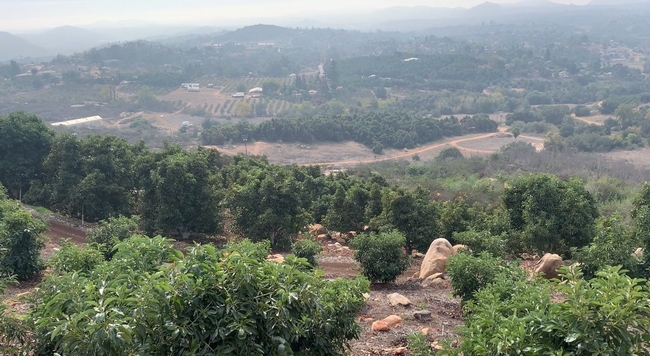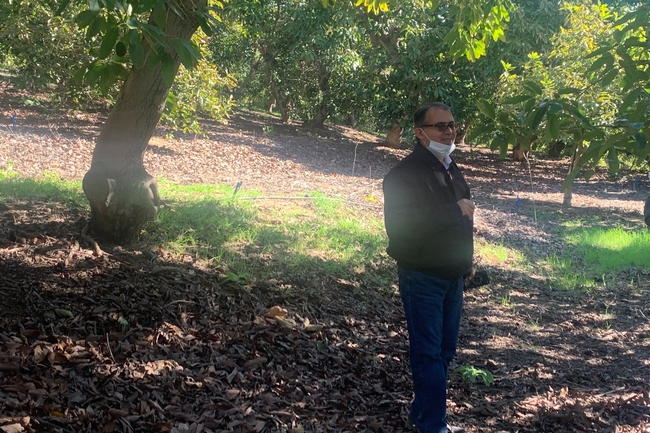
Posts Tagged: grant
UC Davis awarded grant to advance strawberry breeding, genetic tools
The $6.2 million grant centers on protecting crops in the future
The federal government is awarding $6.2 million to University of California, Davis, to study how to use breeding and genetic information to protect strawberry crops from future diseases and pests.
The four-year grant from the National Institute of Food and Agriculture (NIFA) centers on addressing expanding and emerging threats to strawberries, a popular fruit packed with Vitamin C and key to the diets of many Americans.
Enhanced plant breeding, gene editing and other technologies will be key to ensuring strawberry crops are sustainable in the face of climate change and possible restrictions on chemical use, said Steve Knapp, director of the Strawberry Breeding Center and a distinguished professor in the Department of Plant Sciences.
“We need to have the technology so that we can deal with the challenges strawberries face around the world,” Knapp said. “Can we use genetic knowledge to change the DNA in a specific way to get the resistance we need?”
USDA funding
The grant award was one of 25 announced Oct. 5 by NIFA – an agency of the U.S. Department of Agriculture – as part of the Specialty Crop Research Initiative program, which addresses “key challenges of national, regional and multistate importance in sustaining all components of food and agriculture…,” the agency said.
The strawberry industry has lagged behind crops like tomato and wheat when it comes to genetic and technical innovation, Knapp said, and the grant signifies that “now they want the foot on the accelerator.”
A key priority is identifying whether changing DNA molecules can improve disease resistance and what technologies would be needed. Ensuring some genes are expressed while others are suppressed would be part of the analysis.
“We're trying to build in natural resistance to pathogens through the genes that already exist but could be modified with this knowledge,” Knapp said. “If we were able to edit a gene that improves disease resistance, people would want us to use that in breeding.”
The intent is to produce disease-resistant cultivars and identify better ways to diagnose, prevent and manage disease. The research project will also include an economic forecast evaluating the consequences of production changes and communicating with farmers about the laboratory advances, according to the grant proposal.
Gitta Coaker from plant pathology and Mitchell Feldmann, Marta Bjornson and Juan Debernardi from plant sciences are participating in the research, as are scientists from California Polytechnic State University, UC Agriculture and Natural Resources, UC Berkeley, University of Florida and USDA's Agricultural Research Service.
Avocado growers to get irrigation tools, strategies from UC ANR’s Montazar
CDFA grant supports research to optimize water use for iconic California crop
California growers, who account for more than 90% of avocado production in the U.S., will soon be getting some help in weathering the extreme fluctuations of climate change.
Ali Montazar, a University of California Cooperative Extension irrigation and water management advisor, recently received a grant to develop tools and strategies that optimize growers' irrigation practices across Southern California – the state's avocado belt. California avocados are valued at more than $411 million, according to the National Agricultural Statistics Service.
“This region faces uncertain water supplies, mandatory reductions of water use, and the rising cost of water – while efficient use of irrigation water is one of the highest conservation priorities,” Montazar said. “Water is the most critically important input to avocado production.”

At the California Avocado Commission's suggestion, Orange County was added to the study to better capture the range of climates and cropping systems across the region, Montazar said.
He hopes to develop “crop coefficients” that avocado growers can use to determine the optimal irrigation for their crop based on a host of factors: soil type and salinity, canopy features, row orientation, slopes, soil and water management practices, and more.
“Growers are unclear on how much water the crop actually needs under those conditions,” Montazar said.
He will incorporate data from the actual water use in the experimental orchards – including information from the newest soil moisture and canopy temperature sensors – to help ensure growers do not under- or overwater their crops. Overirrigating contributes to a devastating disease, avocado root rot, caused by the plant pathogen Phytophthora cinnamomi.
Another component of the grant supports outreach in disseminating these resources and best practices to the broader agricultural community.
“Developing and adopting these tools and information may have a significant impact on water quality and quantity issues and bolster the economic sustainability of avocado production not only in the well-established production region of Southern California, but also in Kern and Tulare counties where new avocado plantings are growing,” Montazar said.
Preliminary findings and recommendations are expected at the end of 2022.
UC Network Formed to Strengthen Honey Bee Health and Crop Pollination
It's good to see the University of California's Office of the President award a three-year $900,000 grant to four UC Davis campuses to establish a network of bee researchers and engineers to strengthen honey bee health and crop pollination. The grant, titled "Strengthening Honey Bee Health...

A honey bee packing pollen on almond blossoms on the UC Davis campus. California almonds usually begin blooming around Feb. 14. (Photo by Kathy Keatley Garvey)

Extension apiculturist Elina Lastro Niño (center) of UC Davis is a co-principal investigator. (Photo by Kathy Keatley Garvey)

A queen bee and her retinue. (Photo by Kathy Keatley Garvey)
Why More Water Bears Are Heading for the Bohart Museum of Entomology
The Bohart Museum of Entomology at UC Davis, which houses one of the largest collections of water bears or tardigrades in the world, stands to get even more over the next three years. The National Science Foundation (NSF) has awarded a three-year collaborative research grant to five faculty...

Lynn Kimsey, director of the Bohart Museum of Entomology, with part of the museum's tardigrade collection. (Photo by Kathy Keatley Garvey)

The proposed water bear sculpture at Bohart Museum of Entomology. The Bohart Museum Society has set up a go-fund-me account.
A 'Page' in an Important Chapter on Wild and Managed Bees
Congratulations to doctoral student and pollination ecologist Maureen Page of the Neal Williams lab, UC Davis Department of Entomology and Nematology! She's the recipient of a prestigious three-year fellowship, a National Defense Science and Engineering Graduate Fellowship, for her research...

UC Davis doctoral student and pollination ecologist Maureen Page has received prestigious three-year fellowship, a National Defense Science and Engineering Graduate Fellowship, funded by the Department of Defense.


